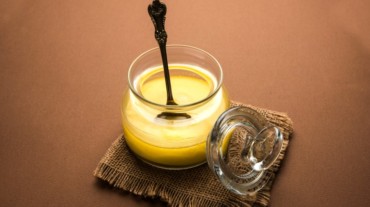
Ghee is loaded with vitamins, omega fatty acids and antioxidants. It has been used as a cooking medium since ancient times and is still present in every Indian home. In fact, Bollywood stars such as Shilpa Shetty Kundra and Rakul Preet recommend consuming ghee daily. You may already know that ghee has a wide range of health advantages, but you should also be aware that not everyone should eat it.
Yes, you read it right! There are a few side effects of ghee as well.
Health Shots reached out to Hari Lakshmi, Consultant Dietician/Nutritionist, Motherhood Hospitals, Chennai, to discuss whether ghee is the right choice for everyone and who should avoid its consumption.

Lakshmi says, “Ghee is healthier than most saturated animal fats. Saturated fats are good in keeping your cholesterol under control and maintaining heart health. But some people believe that ghee is unhealthy for them as it contains fats. Unfortunately it is true.”
“Yes, ghee is rich with healthy fats like omega-3 which is good for your health. But ghee is not good for everyone. There are some cases or health conditions in which one should avoid eating ghee with food.”
Since ghee is a dairy product, people with milk allergies can’t have it or should only consume it in moderation. Symptoms like rash, hives, vomiting or diarrhoea are likely to appear with ghee consumption. While there are some people who tolerate ghee with lactose intolerance. So, if you have a milk allergy or lactose intolerance, consult your doctor over it.

The presence of oxidised cholesterol in ghee can increase the risk of various ailments including heart diseases. Due to the presence of fatty acids, it increases the risk of heart attacks. In fact, the American Heart Association recommends limiting the consumption of saturated fats to less than 7 percent.
Also, read: Rakulpreet and Bhumi are legit ghee coffee fans! Here’s why you should also try
Ghee is not the reason behind liver issues but if you already have liver-related ailments like jaundice, fatty liver, gastrointestinal pain, you should avoid ghee as it may cause serious organ issues. However, consuming ghee with strict moderation does not create a problem for the liver.
Also, read: Consuming ghee and honey together can be harmful! Is it true?
Select Topics of your interest and let us customize your feed.
PERSONALISE NOWIf you are on a weight-loss diet, consuming two teaspoons of ghee in a day is fine. But if you raise it’s intake, it can cause weight gain. Lakshmi says, “Ghee contains Conjugated Linoleic Acid (CLA), which helps people in losing weight but it is still a calorie dense food item and over-consumption of it can cause obesity. So, it is not recommended to obese people.”

While some people find ghee to be a laxative, it can also be difficult to digest. Therefore, you should avoid it or consume it cautiously if you regularly experience digestive problems like indigestion, bloating, or constipation. It is advisable for pregnant women to reduce their ghee consumption because they frequently experience indigestion and bloating.